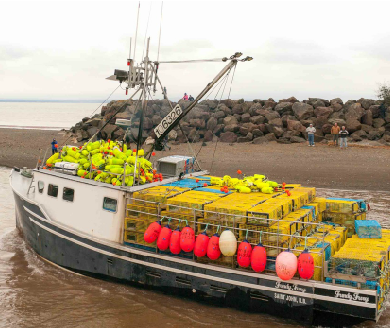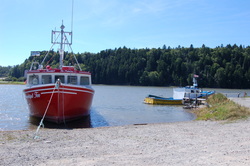

At thirteen years old, Terry Rossiter started working in the lobster fishery by baiting and cleaning out traps. He is now the president of the Alma Fishermen's Association and has been a captain for years.
Jon Sanford focuses on scallops but also works on the lobster boats. After realizing that “university wasn’t for him,” at twenty years old, Jon followed his father’s footsteps and went into the fishery. Jon enjoys working outside and being self-employed. He is the scallop representative for the Alma Fishermen's Association.
Joanne Butland has been involved in the fishery since 1984 and held a lobster license for three years. She now helps on the boats and runs Crooked Creek Adventures.
Fishing seasons
In Canada, the Department of Fisheries and Oceans regulates fishing seasons. The timing of the seasons varies with the species and with each district. In Alma, there are two lobster seasons. In the spring, the boats start going out around mid-April. Terry mentions that the season opens a bit earlier, but there’s not much point in going out too early because the lobsters aren’t moving in early spring. The spring season ends on July 31.
The fall lobster season runs from October 14th to December 31st. Many boats stop fishing before the end of the season.
Most scallop fishing happens at the coldest time of year. The season begins on the second Tuesday in January and extends as late as April 30 if the quota isn’t caught before then. Unlike lobster, the scallop season reflects the time of year and the quota for the whole district. Once the quota is reached, the season is closed. Last winter, catches were good and the quota was reached early.
Usually there is a second scallop season from first Monday in August until the end of September, and the annual quota is split 50/50 between the two seasons. “But this year,” Jon says, “the fleet decided to fish it all in one season because catches were good and prices were good.” Jon was out on the water for only 21 days, and the whole season just lasted six weeks. There won’t be any more scallop fishing until January 2015.
Jon Sanford says many fishermen will go out no matter how cold it is, but he doesn’t go out on the water when the temperature drops below -25°C. Cold conditions make the work difficult and uncomfortable. Also, ice can create major problems and hazardous conditions. “Some years,” Jon says, “we lose a couple weeks of the season because of ice. When the ice builds up, the boats have trouble getting in and out of the harbour.”
When the seasons are closed and the boats are tied up, the fishermen still have work to do. They overhaul and mend the traps, fix their gear and work on their boats.
Catching lobster
There are different designs of lobster traps but all have at least one entrance head, kitchen, funnel head and parlour. The kitchen holds a mesh bag containing bait, most often herring. To get to the bait, the lobster goes in the entrance head. After eating, the lobster tries to leave by the funnel head and is then stuck in the parlour. An escape hatch is placed in every parlour to allow small lobsters to escape – one of several methods used to protect stocks.
Each boat has three hundred lobster traps. The traps are coloured and every one has its own number issued to the licence holder by the Department of Fisheries and Oceans.
For both lobster and scallops, a boat carries the captain and two to four crew. The workers live between Hillsborough and Alma. Joanne Butland estimates that “at least half of Alma is involved in the fishery. Sometimes a woman works at the store but her husband is a fisherman.”
“In the summer, most boats ‘fish singles’,” explains Joanne, “one line with one buoy for one trap.” In the fall, many fishermen also trawl with 15-20 traps per line.
In the spring, the fishermen check the traps once a week. The lobsters move slowly when the water is cold. “In the fall,” says Terry, “you pull them as quick as you can, sometimes even twice a day.” The lobsters are moving and hungry, and easier to catch than in the spring.
After the fishermen pull the traps, they sort their catch. They throw back undersized lobsters, females with eggs on their tails and bycatch, such as scallops or sand sharks.
The fishermen band the claws of the lobsters they’re keeping and put the lobsters in saltwater tanks. The traps are baited and set back or moved to a new spot.
Part of the skill in fishing lobster is predicting the location and movement of the lobster. Different strategies are used. “Some guys have their traps all at one spot,” says Terry. “Others have them all over.”
“There’s a mind game to it,” he adds. “There’s a time to be in certain places and time to move. Sometimes even though they’re full, you move them to another spot. It’s like gambling. But you learn.”
“Mostly though, it’s like other self-employment. What you get out of it depends on what you put into it,” Terry concludes.
“Fishing lobster,” says Joanne “is exciting. Sometimes you get lots of lobsters in the traps. It’s like a lottery.”
Jon adds, “Lobster fishing is ‘hurry up and wait’,” because fishermen rush to pull and set traps, but then they have to wait for the lobsters to be caught.
“With scallops,” he says, “it’s the same day after day.”
According to Jon, fishing scallops “is not nearly as exciting as fishing lobster. You go to the scallop grounds and fish until you’re done. You tow your drags; pull up every 15-20 minutes.” The crew pick through the catch, tossing back all the scallops that are too small to be caught legally. The larger scallops are shucked right away, washed and put into cloth bags which are then stored on ice.
Prices (or how an earthquake in Japan affects business in Alma)
Fishing isn’t a 9-5 job. The fishermen go out at all hours and often work long days without a set wage or salary. Their income reflects the costs (particularly fuel, labour and bait) and the price of the product. Lobster and scallops from Alma are exported all around the world; consequently, the price fluctuates depending on global factors.
A main challenge over the last few years is the low price of lobster.
“Last summer, I don’t think anyone made a cent lobstering at $3.25/lb. but the fall was half-decent and scalloping was good. No one thinks about last summer now,” Terry says.
“There are good years and bad years,” says Terry. “We’re making a living. But you have to watch your money.”
“The resource is strong, the stocks are good but price is the issue for lobster,” concludes Joanne. “And lobster is the bread and butter of the Alma fishery.”
In 2014, the price of scallops was high. The reason for the high price is complicated but stems from strong Asian demand for North American scallops. Apparently, many people in Southeast Asia didn’t want to consume their local scallops because they were concerned that that these shellfish were contaminated by radioactivity – the result of the damage to Japanese nuclear reactors following the tsunami in March 2011.
Jon said that the high prices didn’t necessarily translate into more money for the fishermen. Most years only a few fishermen go out scalloping in the winter. This year, however, because of the high prices, all the fishermen went out. As a result, the total catch was spread among many more boats and the season ended early.
Challenges
“The hardest part of the job,” says Jon, “is the long hours.” Because of huge tides, the boats can only come to shore around high tide. As a result, the shortest possible work day is 12-14 hours long. Most fishermen work longer days. When fishing for scallops, most days last 15 to 16 hours. In the fall, the lobster fishermen work 24-hour days.
“Once,” Terry adds, “I was out for eleven days straight. We would just come in, unload and turn around and go back out. You just sleep when you get a chance — just lie down for a few hours when you can.”
Another problem is seasickness. A lot of fishermen, including Joanne, Jon and some of the captains get sick whenever the water is rough, sometimes, says Joanne, they “still get sick every other day.”
“You really have to like it if you keep going out even though you get sick a lot,” says Joanne. Being seasick “is one of those things you really don’t get over until you get back to shore.”
The beauty of buying local
Buying directly from the lobster shops in Alma is one way to support all the people working in the fishery. Another reason is taste.
“The quality of our [shellfish] is as good as it gets,” says Joanne.
“You’ll get the best quality at the local markets,” adds Jon, “because they are the first ones to handle it.”
When the season is open, you can see the lobsters coming off the boats and you know you’re getting freshly caught lobster. And with seafood, freshness is key to great taste.
In Albert County, we are fortunate to have three lobster shops in Alma that offer fresh, local seafood. And although we call them lobster shops and their tanks are filled with live lobster (often awaiting export), all three stores sell other seafood as well.
Written by Janet Wallace, June 2014 for Fresh from Fundy: Celebrating the Foods of Albert County, published by Foods of the Fundy Valley.
 RSS Feed
RSS Feed